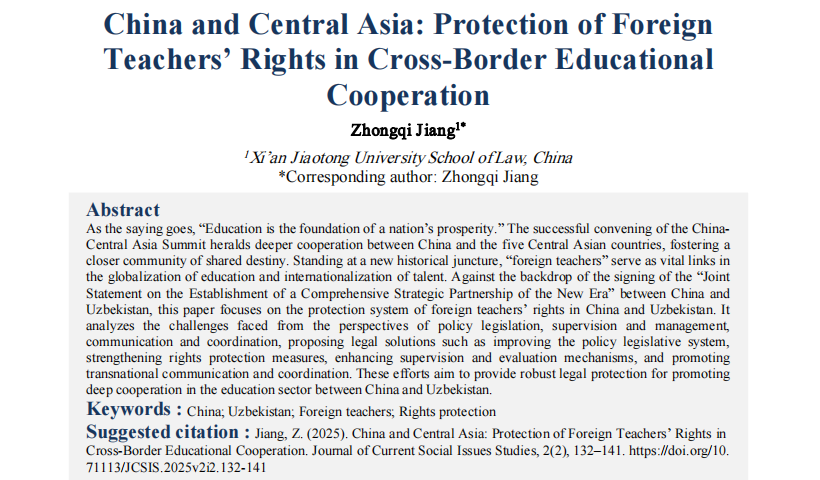China and Central Asia: Protection of Foreign Teachers’ Rights in Cross-Border Educational Cooperation
DOI:
https://doi.org/10.71113/JCSIS.2025v2i2.132-141Keywords:
China, Uzbekistan, Foreign teachers, Rights protectionAbstract
As the saying goes, “Education is the foundation of a nation’s prosperity.” The successful convening of the China-Central Asia Summit heralds deeper cooperation between China and the five Central Asian countries, fostering a closer community of shared destiny. Standing at a new historical juncture, “foreign teachers” serve as vital links in the globalization of education and internationalization of talent. Against the backdrop of the signing of the “Joint Statement on the Establishment of a Comprehensive Strategic Partnership of the New Era” between China and Uzbekistan, this paper focuses on the protection system of foreign teachers’ rights in China and Uzbekistan. It analyzes the challenges faced from the perspectives of policy legislation, supervision and management, communication and coordination, proposing legal solutions such as improving the policy legislative system, strengthening rights protection measures, enhancing supervision and evaluation mechanisms, and promoting transnational communication and coordination. These efforts aim to provide robust legal protection for promoting deep cooperation in the education sector between China and Uzbekistan.
Downloads
References
[1]Chengwu, Lou, & Wanbing, Shi (2005). Research on Management Models of Research Universities. Higher Education Press.
[2]Zolfaghari, A., Sabran, M. S., & Zolfaghari, A. (2009). Internationalization of higher education: challenges, strategies, policies and programs. Online Submission, 6(5), 1-9.
[3]Xiaoping, Deng (2019, August 1). China is a big market, many countries want to have some cooperation and trade with us, we should make good use of it, from http://cpc.people.com.cn/n1/2019/0801/c69113-31270028.html.
[4]Yuanyuan, Zhang (2009). Research on the Management Problems of Foreign Teachers in China’s Private Colleges and Universities - Taking Private S College in Jilin Province as an Example. Northeast Normal University PhD Dissertation.
[5]Shi Shan (2006). The Road of Internationalization of Chinese Universities. International Talent Exchange (11), 4.
[6]Yong Xie, & Nianning, Chen (2013). The Development, Problems and Countermeasures of China’s Higher Education’s Foreign Intelligence-Related Work. Natural Dialectics Research (07), 67-72.
[7]Ziguo, Li (2023 January 30). Uzbekistan: Moving Forward in the Midst of Profound Changes, from https://www.ciis.org.cn/yjcg/xslw/202301/t20230130_8852.html.
[8]Sultanov Mukhtor Mamadalievich, & Dzhumaev Mamanazar Irgashevich (2020). The Basic Directions of the Accomplishment of Preparatory Conception of Future Teachers in Modernization of Education. Technium Social Sciences Journal (10), 115-120.
[9]China Society of Higher Education, Branch of Introducing Foreign Intelligence (2007). Theory and Practice of University Internationalization. Peking University Press.
[10]Literature Research Office of the Central Committee of the Communist Party of China (2015). Extracts from Xi Jinping’s Discourses on the Comprehensive Rule of Law. Central Literature Press.
[11]Xin Wang (2023). Research on the Status Quo of Foreign Teachers’ Management and Optimization Strategies in Local General Colleges and Universities. Shenyang Normal University PhD Dissertation.
[12]Wanbing, Shi, & Hui Yang (2013). Empirical Research on the Status Quo of Teaching and Management of Foreign Teachers in Colleges and Universities - Taking Liaoning Geographic Higher Education Institutions as Research Objects. Modern Education Management (02), 86-90.
[13]Kun Qian (2022). Exploring the Path of Teacher Virtue File System Construction for Foreign Teachers in China Lantai Inside and Outside (27), 55-57.
[14]Sitong, Lai (2022). A preliminary study on cross-cultural management of foreign talents in colleges and universities. Heilongjiang Human Resources and Social Security (05), 63-65.
[15]Xianying, Cheng, & Dongbo, Fang (2021). Research on Management Mode of Foreign Teachers. Mechanical Vocational Education (09), 58-62.
[16]Jiayun, Zhu, & Ning Miao (2018). Research on Management of Foreign Teachers. Education Teaching Forum (25), 15-17.
[17]Yanhui, Li (2010). Trying to Discuss the Teaching Characteristics and Appointment and Management of Foreign Teachers. Education and Career (18), 56-57.
[18]Yun Qin (2020). Problems and Optimization Strategies in Teaching Management of Foreign Teachers in Colleges and Universities. Journal of Heilongjiang Teacher Development Institute (03), 22-24.
[19]Adriance, Laura A. (2005) Exploring Influences on Teachers’ Motivational Factors Related to Human Capital Retent in the Christian School. Capella University Press.
[20]Kui Ye (2017). The Management of Foreign Teachers in Higher Vocational Colleges and Universities from a Cross-Cultural Perspective. Economic and Trade Practice (12), 252-253.
[21]Hui Yang (2015). Research on the Management Elements of Foreign Teachers in Higher Education Schools Based on System Management Theory. Northeastern University PhD Dissertation.
[22]Lina, Zheng (2020). Management of Foreign Teachers in Colleges and Universities: Problems and Decisions. Education Modernization (05), 128-129.
[23]Zhijie, Chen (2015). Exploring the Cross-cultural Management of Foreign Teachers in General Colleges and Universities--Taking Fujian Agriculture and Forestry University as an Example. Journal of Fujian Institute of Education (04), 59-62.
[24]Aie Cao, & J. Hu (2012). Analysis of Cross-cultural Management of Foreign Teachers in Colleges and Universities Based on the Differences between Chinese and Western Cultures. Journal of Nanyang Polytechnic Institute (03), 60-63.
[25]Zhihong, Wu, Daming, Feng, & Jiafang, Zhou (2000). New Educational Management. East China Normal University Press.
[26]Qiuhong, Zhang, & Xueyan, Zhang (2010). The application of humanistic concepts in the practical work of expatriate teacher management. Journal of Changchun University (02), 99-101.
[27]Tajino A., & Tajino Y. (2000). Native and Non-Native: What Can They Offer? Lessons from Team Teaching in Japan. ELT Journal (01), 54.
[28]Lu Xi, & Dalu, Zhang (2023). The Dilemma of Implementing Faculty Internationalization in Colleges and Universities in the Post-Global Era and Future Prospects. China Medical Education Technology (02), 161-165.
[29]Qiang Li (2024 February 27). Deepening Educational Cooperation between China and Uzbekistan, from http://paper.people.com.cn/rmrb/html/2024-02/27/nw.D110000renmrb_20240227_3-17.htm.
[30]Hui Murong, Feng Duan, & Jialing, Zhao (2021). Research on the Optimization of Foreign Teachers’ File Management in Universities. Journal of Zhaoqing College (03), 87-90.
[31]Yun Qin (2020). Problems and Optimization Strategies in Teaching Management of Foreign Teachers in Colleges and Universities. Journal of Heilongjiang Teacher Development Institute (03), 22-24.

Downloads
Published
How to Cite
Issue
Section
License
Copyright (c) 2025 Zhongqi Jiang

This work is licensed under a Creative Commons Attribution 4.0 International License.






















